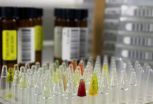(Press-News.org) It has long been believed that drinking green tea is good for the memory. Now researchers have discovered how the chemical properties of China's favorite drink affect the generation of brain cells, providing benefits for memory and spatial learning. The research is published in Molecular Nutrition & Food Research.
"Green tea is a popular beverage across the world," said Professor Yun Bai from the Third Military Medical University, Chongqing, China. "There has been plenty of scientific attention on its use in helping prevent cardiovascular diseases, but now there is emerging evidence that its chemical properties may impact cellular mechanisms in the brain."
Professor Bai's team focused on the organic chemical EGCG, (epigallocatechin-3 gallate) a key property of green tea. While EGCG is a known anti-oxidant, the team believed it can also have a beneficial effect against age-related degenerative diseases.
"We proposed that EGCG can improve cognitive function by impacting the generation of neuron cells, a process known as neurogenesis," said Bai. "We focused our research on the hippocampus, the part of the brain which processes information from short-term to long-term memory."
The team found that ECGC boosts the production of neural progenitor cells, which like stem cells can adapt, or differentiate, into various types of cells. The team then used laboratory mice to discover if this increased cell production gave an advantage to memory or spatial learning.
"We ran tests on two groups of mice, one which had imbibed ECGC and a control group," said Bai. "First the mice were trained for three days to find a visible platform in their maze. Then they were trained for seven days to find a hidden platform."
The team found that the ECGC treated mice required less time to find the hidden platform. Overall the results revealed that EGCG enhances learning and memory by improving object recognition and spatial memory.
"We have shown that the organic chemical EGCG acts directly to increase the production of neural progenitor cells, both in glass tests and in mice," concluded Bai. "This helps us to understand the potential for EGCG, and green tea which contains it, to help combat degenerative diseases and memory loss."
This paper is published as part of a collection of articles bringing together high quality research on the theme of food science and technology with particular relevance to China. Browse free articles from Wiley's food science and technology publications including the Journal of Food Science, Journal of the Science of Food and Agriculture and Molecular Nutrition & Food Research.
### END
Brainy beverage: Study reveals how green tea boosts brain cell production to aid memory
2012-09-05
ELSE PRESS RELEASES FROM THIS DATE:
Can videogaming benefit young people with autism spectrum disorder?
2012-09-05
New Rochelle, NY, September 5, 2012—According to the Centers for Disease Control and Prevention (CDC), 1 in 88 children in the U.S. has autism spectrum disorder (ASD), a broad group of neurodevelopmental disorders. Children and adolescents with ASD are typically fascinated by screen-based technology such as videogames and these can be used for educational and treatment purposes as described in an insightful Roundtable Discussion published in Games for Health Journal: Research Development, and Clinical Applications, a peer-reviewed publication from Mary Ann Liebert, Inc.. ...
Trout will become extinct in the Iberian Peninsula in less than 100 years
2012-09-05
Climate change, pollution, the extraction of water for irrigation and overfishing all threaten the survival of the common trout. This fish is very sensitive to changes in its environment and, according to the Spanish study, its habitat will have reduced by half by the year 2040 and will have completely disappeared from Iberian rivers by 2100, so its population will become extinct.
Global warming is threatening the existence of many fish species, especially those in the salmonid family, which are sensitive to temperature changes as they require clear and fresh water to ...
Infections in rheumatoid arthritis patients: Mayo Clinic study finds way to pinpoint risk
2012-09-05
ROCHESTER, Minn. -- Rheumatoid arthritis alone is painful and disabling, but it also puts patients at higher risk of death. The greater susceptibility to infections that accompanies the autoimmune disorder is one reason. Assessing the danger of infection a particular patient faces so it can be addressed can prove challenging for physicians. A Mayo Clinic study finds that a risk score can be developed to predict a patient's chances of having serious infections. The score uses information about how rheumatoid arthritis is affecting a patient, plus factors including age, corticosteroid ...
Epigenetic causes of prostate cancer
2012-09-05
This press release is available in German.
In about half of all prostate tumours, there are two genetic areas that are fused with one another. When this is not the case, the exact way cancer cells originate in prostate tumours was not clear until now. Scientists at the Max Planck Institute for Molecular Genetics in Berlin, in cooperation with a team of international researchers, were able to show that the genesis of this fusion-negative prostate cancer has epigenetic causes: methyl groups are distributed differently over the DNA in the cancer cells than in healthy cells. ...
Harnessing anticancer drugs for the future fight against influenza
2012-09-05
Medical Systems Virology group at the Institute for Molecular Medicine Finland (FIMM) at the University of Helsinki, together with its national and international collaborators, developed a new cell screening method that can be used to identify potential anti-influenza drugs. The researchers were able to identify two novel compounds with anti-influenza activity, obatoclax and gemcitabine and prove the efficacy of a previously known drug saliphenylhalamide.
The study was recently accepted for publication in the Journal of Biological Chemistry and is now available online.
Influenza ...
DNA sequences need quality time too - guidelines for quality control published
2012-09-05
Like all sources of information, DNA sequences come in various degrees of quality and reliability. To identify, proof, and discard compromised molecular data has thus become a critical component of the scientific endeavor - one that everyone generating sequence data is assumed to carry out before using the sequences for research purposes.
"Many researchers find sequence quality control difficult, though", says Dr. Henrik Nilsson of the University of Gothenburg and the lead author of a new article on sequence reliability, published in the Open Access journal MycoKeys. ...
Archaeology team announces 'huge step forward' in King Richard III search
2012-09-05
Archaeologists from the University of Leicester who are leading the search for King Richard III have announced they have overcome the first significant hurdle of their investigation – and made a huge step forward in the search for the King by locating the church where he was buried.
The University of Leicester is leading the archaeological search for the burial place of King Richard III with Leicester City Council, in association with the Richard III Society.
In 1485 King Richard III was defeated at the battle of Bosworth. His body, stripped and despoiled, was brought ...
Study uncovers simple way of predicting severe pain following breast cancer surgery
2012-09-05
WOMEN having surgery for breast cancer are up to three times more likely to have severe pain in the first week after surgery if they suffer from other painful conditions, such as arthritis, low back pain and migraine, according to a Cancer Research UK study published today (Wednesday) in the British Journal of Cancer.
Of the women surveyed, 41 per cent reported moderate to severe pain at rest, and 50 per cent on movement, one week after their surgery. Most patients having breast cancer surgery are discharged home by this time.
Psychological state was also important, ...
When do we lie? When we're short on time and long on reasons
2012-09-05
Almost all of us have been tempted to lie at some point, whether about our GPA, our annual income, or our age. But what makes us actually do it?
In a study forthcoming in Psychological Science, a journal of the Association for Psychological Science, psychological scientists Shaul Shalvi of the University of Amsterdam and Ori Eldar and Yoella Bereby-Meyer of Ben Gurion University investigated what factors influence dishonest behavior.
Previous research shows that a person's first instinct is to serve his or her own self-interest. And research also shows that people are ...
Children exposed to 2 phthalates have elevated risk of asthma-related airway inflammation
2012-09-05
Children exposed to diethyl phthalate (DEP) and butylbenzyl phthalate (BBzP)—phthalate chemicals commonly found in personal care and plastic products—have elevated risk of asthma-related airway inflammation, according to researchers at Columbia Center for Children's Environmental Health (CCCEH) at the Mailman School of Public Health.
Of the 244 children aged 5 to 9 in the study, all had detectable levels of phthalates in their urine although these varied over a wide range. Higher levels of both phthalates were associated with higher levels of nitric oxide in exhaled ...




